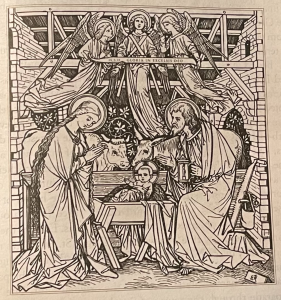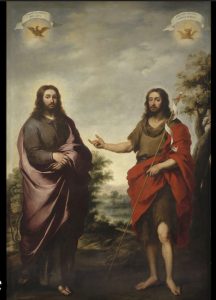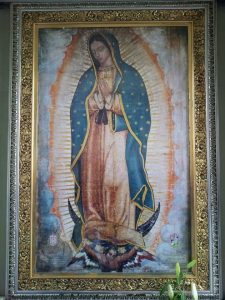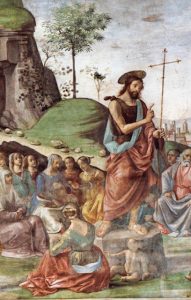Merry Christmas to everyone! Today has come with joy to celebrate the nativity of the Lord Jesus Christ. Today brings happiness, excitement counting and opening our gifts, and meeting family members and friends. Christmas erases loneliness temporarily because we are surrounded by those whom we love. Sorrow and loneliness are seemingly separated from us, the ongoing fears stop, and darkness comes to an end because the “Light” shines in the world; the One who comes is worth the waiting.
The Prophet Isaiah in the first reading tells us that there is a promise of God’s glory through Jesus. He brings salvation to the ends of the world. All the difficulties will be removed. Many events may have been rewarded with much comfort, peace, and joy. Indeed, the Lord Jesus will complete His work, promising us not to forsake those for whom He would be redeemed and sanctified.
The second reading from the Book of Titus 3:4-7 reminds us that if there is change in our lives in contrast with the olden times when people’s ways were sinful living, then it would surely bring the kindness and love of God, our Savior. God alone is the reason for the change of heart and life of a believer. Even though God rescues us on the merit of His great mercy, spiritual cleansing will always depend on our effort to act and do. Some of our Protestant Brethren always believe the disconnection of Faith and good works. They solely rely on God’s redeeming grace. Well, I believe that we must sincerely do our part in our salvation. We must work for it. Yes, salvation is a gift, but we must be accountable for our lives rather than just being passive because He is merciful and gracious.
The gospel today, which I decided to reflect on, is taken from Luke 2:15-20, who narrates to us about the shepherds, saying,” Let us now go even unto Bethlehem, and see this thing, which is come to pass, which the Lord hath made known unto us.” Maybe seeing the angels disappearing or rising up in the sky would be a phenomenon which the shepherds cannot understand; however, they came with haste, where they “found Mary, Joseph and the baby lying in a manger.” “What message?” I would say, “Today in the town of David, a Savior has been born to you, He is Christ the Lord.” The birth of the Messiah has taken place. That is the message; they have seen the baby and then spread the word to the people they are in contact with. They were not so religious, just ordinary workers or common people; however, I believe that what is remarkable about these shepherds is the impact of the angels’ visit which they have seen and the shepherds’ own visit to the Savior. They are filled with praise for God. They were changed and became devoted worshippers of God. What can we learn from this passage?
First, it may seem simplistic that those shepherds, before they acted on praising the Savior, meditated well. They prayed to accept the message of the birth of the Messiah. Maybe if angels manifested to those who are learned and the Pharisees, like many of us, they would maybe engage in a debate that the Messiah would not appear as a baby, but as a strong man, who has the capacity to dominate men.
Second, the birth of the Messiah, which has been narrated thru the gospel, that He came with humility, is the major stumbling block for many. Even now, intelligent people cannot accept the Christmas story. They cannot accept also that hundreds of millions of people throughout history lie in a manger.
Third, I believe that what matters is that it actually happened, rather than finding significance behind the story; well then, it is a great folly. It is the height of mystery and of a wisdom far beyond man’s comprehension. I believe that the key to finding truth is through humble action — a simple prayer, taking what one hears at face value, attending that Bible study or worship service, and opening up one’s heart to another. We must be little children with open minds and simplicity in order to believe what we are told about God’s coming on earth.
I pray that putting ourselves into the mind of St. Augustine reflects upon the humility and great love that God exhibited for us in sending His only Son to us assuming our fallen nature. “What human being could know all the treasures of wisdom and knowledge hidden in Christ and concealed under the poverty of His humanity? For, ‘being rich, he became poor for our sake that by his poverty we might become rich.’ When He assumed our mortality and overcame death, He manifested Himself in poverty, but He promised riches though they might be deferred; He did not lose them as if they were taken from Him. How great is the multitude of His sweetness which He hides from those who fear Him but which He reveals to those that hope in Him!” (Sermon 194)
When we cannot comprehend the mystery of Jesus’ Incarnation, at least we fully understand that in His richness, He accepted poverty in order for us to be rich in everything.
May God bless us with His presence. Therefore, let us give up our pondering and fall down on our knees.
Fr. Arlon, osa
——————-
El dictado del corazón: La Natividad del Señor (Amanecer de Navidad)
- Isaías 62:11-12
- Salmo 97:1, 6, 11-12
- Tito 3:4-7
- Lucas 2:15-20
¡Feliz Navidad a todos! Hoy venimos con alegría a celebrar la natividad de nuestro Señor Jesucristo. Él nos trae felicidad, alegría y esperanza.
La Navidad borra la soledad temporalmente porque estamos rodeados de los que amamos. Las penas y la soledad aparentemente se separan de nosotros, el miedo constante cesa y la oscuridad llega a su fin porque la “Luz” brilla en el mundo, Aquel digno de esperar.
El profeta Isaías, en la primera lectura, nos dice que hay una promesa de la gloria de Dios a través de Jesús. Él trae la salvación hasta los confines del mundo. Todas nuestras dificultades serán eliminadas. Muchos eventos pueden haber sido recompensados con consuelo, paz y alegría. De hecho, el Señor Jesús completará Su obra prometiéndonos que no abandonará a aquellos a quienes Él quiere redimir y santificar.
La segunda lectura del Libro de Tito 3:4-7, nos recuerda que si hay un cambio en nuestras vidas, en contraste con los tiempos antiguos cuando los caminos de las personas son una vida pecaminosa, entonces seguramente traerá la bondad y el amor de Dios, nuestro Salvador. Sólo Dios es la razón del cambio de corazón y de vida de un creyente. Aunque Dios nos rescata por el mérito de su gran misericordia, la limpieza espiritual siempre dependerá de nuestro esfuerzo por actuar y hacer. Algunos de nuestros hermanos protestantes creen en la desconexión de la fe y las buenas obras. Únicamente confían en la gracia redentora de Dios.
Bueno, yo creo sinceramente que debemos poner de nuestra parte para alcanzar la salvación. Debemos trabajar para ello. Sí, la salvación es un regalo, pero debemos ser responsables de nuestras vidas en lugar de ser pasivos porque Él es misericordioso y bueno.
El evangelio de hoy que decidí reflexionar tomado de Lucas 2:15-20 nos narra acerca de los pastores, diciendo: Vayamos ahora hasta Belén, y veamos esto que ha acontecido, que el Señor ha dado a conocer a nosotros.” Tal vez ver a los ángeles desaparecer o subir al cielo sería un fenómeno que los pastores no pueden entender, sin embargo, llegaron con prisa, “encontraron a María, a José y al niño acostado en un pesebre”. “¿Qué mensaje?” Yo diría: “Hoy en el pueblo de David les ha nacido un Salvador, Él es Cristo el Señor”. El nacimiento del Mesías ha tenido lugar. Ese es el mensaje, han visto al bebé, luego pasan la voz a las personas con las que están en contacto, no eran tan religiosos, eran trabajadores comunes o gente común, sin embargo, creo que lo notable de estos pastores, fue el impacto de los ángeles que han visto y la propia visita de los pastores al Salvador. Están llenos de alabanza a Dios. Ellos cambiaron y se convirtieron en devotos adoradores de Dios.
¿Qué podemos aprender de este pasaje?
Primero, puede parecer simplista que esos pastores antes de actuar alabando al Salvador, meditaron bien, oraron para aceptar el mensaje del nacimiento del Mesías. Tal vez si los ángeles se manifestaran a los eruditos y a los fariseos, como muchos de nosotros, tal vez entremos en un debate de que el Mesías no aparecería como un bebé sino como un hombre fuerte, que tiene la capacidad de dominar a los hombres.
Segundo, el nacimiento del Mesías, que ha sido narrado a través del evangelio, Él vino con humildad, es el mayor escollo para muchos. Incluso ahora, las personas inteligentes no pueden aceptar la historia de la Navidad. No pueden aceptar también que cientos de millones de personas a lo largo de la historia nacen en un pesebre.
En tercer lugar, creo que lo que importa es que realmente sucedió, más que encontrar un significado detrás de la historia, pues bien, es una gran locura. Es el colmo del misterio y de una sabiduría mucho más allá de la comprensión del hombre. Creo que la clave para encontrar la verdad es a través de la humildad: una oración, tomar lo que uno escucha al pie de la letra, asistir a ese estudio bíblico o servicio de adoración, abrir el corazón de uno a otro. Debemos ser niños pequeños de mente abierta y sencillez para creer lo que se nos dice acerca de la venida de Dios a la tierra.
Ruego, que al poner en la mente de San Agustín refleje la humildad y el gran amor que Dios mostró por nosotros al enviarnos a Su único Hijo asumiendo nuestra naturaleza caída. “¿Qué ser humano podría conocer todos los tesoros de sabiduría y conocimiento escondidos en Cristo y ocultos bajo la pobreza de su humanidad? Porque, ‘siendo rico, se hizo pobre por amor a nosotros, para que nosotros fuésemos enriquecidos con su pobreza’. Cuando asumió nuestra mortalidad y venció la muerte, se manifestó en la pobreza, pero prometió riquezas, aunque fueran diferidas, no las perdió como si se las quitaran a Él. ¡Cuán grande es la multitud de su dulzura, que esconde de Él los que le temen, pero que Él revela a los que esperan en Él!” (Sermón 194)
Cuando no podemos comprender el misterio de la Encarnación de Jesús, al menos comprendemos plenamente que en Su riqueza, Él aceptad pobreza para que seamos ricos de todo. Que Dios nos bendiga con Su presencia. Por lo tanto, dejemos que nos preguntemos, cuestionemos y caigamos de rodillas.
Amén.
Padre Arlón, osa
———————
The Dictate of the Heart: Extraordinary Form Latin Christmas Homily
Merry Christmas to everyone. We feel the atmosphere of Christmas when everyone is happy and excited to open gifts we have received. However, what truly makes us happy is the Savior, who comes to us in human history for our salvation. We cannot celebrate Christmas without Joseph, Mary, and Jesus. This time of the year, we cannot say that there is separation of the Church and State. Even in Muslim countries they have Christian symbolisms that are visible to make it “The most wonderful time of the year.” People celebrate Christmas because of the birth of our Savior, Jesus Christ. It is great to celebrate with our loved ones being together at Christmas. I want to bring up the reason of the season, Jesus Christ, “The Christ of Christmas.” We begin with this gospel from St. John 1:1-14 which we hear at every mass as the second gospel. Today, I begin this morning by looking at John 1:1-3 with its famous words: “In the beginning was the Word, and the Word was with God, and the Word was God. He was in the beginning with God. All things came into being through Him, and apart from Him nothing came into being that has come into being.” It is clearly stated that these verses tell us that, “the Christ of Christmas” was and is God. I want to invite you to reflect on the following points:
First, Jesus who came on earth is not just a baby; he lived with us in history, and his existence was included in the census. “In those days Caesar Augustus issued a decree that a census should be taken of the entire Roman world,” begins Luke 2:1 to put us in the proper context of the celebration of Christmas. Census is the official count of people to ensure the government of tax revenues as well.
Second, Jesus has earned a reputation of being a great preacher, teacher, and Master of his own disciples. He was not only a man who speaks of goodness and about the message of the Father, but the bible reveals to us that He is God. This is the fundamental truth that we must accept, rather than to neglect and reject His teaching.
Third, by Jesus’ “divinity,” we believe that He was not just a divinely inspired teacher, but the Son of God Himself. The Bible clearly teaches it, and it does so very strongly in this passage.
John 1 teaches that Jesus is God. In fact, it teaches it repeatedly and emphatically, saying “in the beginning was the Word.” The term, “The Word”, here is speaking about Jesus, which John makes very clear later. But it is interesting to compare where all 4 gospels begin. Mark begins with John the Baptist. Matthew goes back to Abraham (1:1) and the beginning of the Jews. Luke traces the genealogy all the way back to Adam. But John goes to “the beginning”! You can’t go back any further than that!
So, in Chapter 1, John teaches that Jesus was “in the beginning.” This is important. It is only GOD who is “in the beginning” — like Genesis 1 says, “In the beginning, GOD.” Using the same wording, He says Jesus was “in the beginning.” He is teaching us that Jesus is God! Then it goes on to say, “The Word was “with God.” A fairly literal translation of the Greek here would be: “The word was ‘face to face’ with God” or “in relationship with God.” This is evidence of the doctrine of the Trinity: from all eternity, God the Father, God the Son, and God the Holy Spirit have been “face to face” in relationship with each other — before anything else ever came into being or was created. Jesus was right there, “face to face” with God the Father and the Spirit, eternal, GOD!
With the verse, “AND THE WORD WAS GOD”! you just can’t put it any more clearly than that – in English! In the original (Greek) language, it IS even more emphatic, because the word “God” here is in the resounding and forceful position. The Greeks would put the word that they want to emphasize first, and so John does that here; he puts the word “God” first and says: “GOD was the word”! He is really emphasizing that “the Word” that John is talking about here, Jesus Christ, is God! St. John, the evangelist, is saying it more insistently!
In verse 3 it goes on to say, “All things came into being through Him, and apart from Him, nothing came into being that has come into being.” Just to make sure that we clearly understand how much “God” Jesus really is, the scripture emphasizes here, saying He is the God who made everything. Everyone knows Genesis 1:1, “In the beginning, God created the heavens and the earth.”
So here the Bible says, when you think of the God who “in the beginning created the heavens and the earth” — that is Jesus! That is the “God” He is. He is not just “a god”, or some minor god. He is THE God – He’s the One you think about who created everything in the beginning – that is Jesus! In fact, it clarifies it even more, saying: “without Him, nothing came into being that has come into being”! In other words, NOTHING that was created was made without Him! Jesus is God!
It says, “nothing came into being that has come into being” apart from Him. The scripture is also asserting that Jesus Himself never “came into being.” EVERYTHING that “came into being” was made by HIM. He Himself does not fit in that category of “coming into being” — because HE made everything that “came into being.” He is the Prime Mover; He is before all things; He was the Creator of everything and was uncreated Himself.
So, John 1:1-3 has this repeated emphasis: Jesus is the One who existed from the very beginning; He existed that way face to face with God the Father; He IS God, and He is that creator God of Genesis 1 who made everything, and was never created Himself. John 1:1-3 could not be a stronger statement that Jesus Christ, the Christ of Christmas, was and is GOD!
However, we also need to understand that it is not only John 1 that teaches the Divinity of Jesus. Many other scriptures do as well. We don’t have the time to look at all of them.
Therefore, Jesus is not just a “part” of God, or some “offshoot” of God, for He is the “FULLNESS” of Divinity. Everything you can think of when you think of God – that’s who Jesus is. He was and is 100% God!
St. Augustine says, “Let us celebrate with fervent devotion His birthday in the form of a servant…Since we are not yet ready for the banquet of our Father, let us grow familiar with the manger of our Lord Jesus Christ.” (Sermon on the Nativity, St. Augustine of Hippo, 354-430 A.D.)
MERRY CHRISTMAS AND A GRACE-FILLED NEW YEAR 2023.
Fr. Arlon, osa











